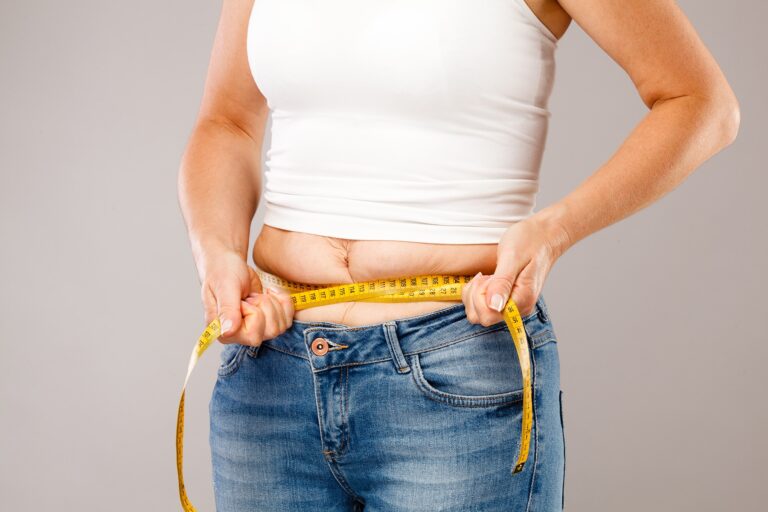Yes, it is. Your monthly periods are accompanied by some unwanted side effects including water retention, cravings, bloating and mood swings. A woman’s weight fluctuates drastically during this period.
The weight gain happens differently for different women. Some gain weight during ovulation, others in the middle of the cycle while others after ovulation. Others get no extra pounds but the fact that the waistbands have gotten snugger, makes them feel like they have added weight around the midsection. It happens differently for every woman.
What causes period weight gain?
Most women will gain some pounds at least five days before their periods. This happens due to the progesterone hormone. Estrogen dominates the first half of your cycle if you consider day 1, the first day your menses cycle. In most women, this period spans around two weeks.
Progesterone then takes over the second half and causes glycogen and fat deposits to build up in the inner linings of the uterus. This helps in the storage of nutrients in case the egg becomes fertilized. The water retention caused by progesterone is the reason you gain some weight.
The menstrual cycle and hormones like progesterone prepare the body and especially the womb for a possible pregnancy. If no conception happens, progesterone levels will fall when you get your period. Water retention will also fall hence you lose the ‘weight’. This is the reason there is too much peeing as the water retention goes away.
During the first half of the menstrual cycle, just before ovulation, the progesterone levels are low and estrogen levels high. The energy and mood is enhanced in your body. In the second part, which is after ovulation, progesterone dominates and causes many physiological changes that influence how you eat. The body gets an increased appetite, sweet cravings, water retention increases, and the breast enlarge. Water retention will cause a temporality weight gain that normalizes as the menstruation ends.
Other Reasons for gaining weight
Water retention is the main reason for weight gain during this period but there are also other factors we need to consider. They include:
Cravings
Premenstrual syndrome (PMS) weight gain can be attributed to the cravings one has during this period. One tends to snack more than usual especially on comfort foods like cakes and chocolates. There is an increased craving for sweet things and junk. These cravings are natural and are your body’s way of preparing for pregnancy that could happen. If the pregnancy doesn’t happen, then you will gain weight from all the unhealthy eating. Exercising and eating healthy will bring back your weight to normal.
Bloating
Bloating is one of the symptoms of menstruation. Gas volumes in the intestines increase during this period causing bloating. This then causes abdominal cramps or constipation. Inactivity too will cause the bloating while being active keeps the gas levels in the intestines down. This bloating sensation makes one feel like they are carrying extra weight.
Magnesium levels decrease
The days before the periods begin, magnesium levels decrease causing a decrease in insulin levels. This makes the brain to assume glucose levels are low leading to increased sugar consumption. This in turns causes weight gain.
How not to gain weight during ovulation
The weight gain during ovulation goes away immediately the period stops so there is no need to panic. It is an unpleasant experience though, but the good news is that you can prevent it from happening or at least reduce it. If the stubborn pounds stay on, there are several things you can do, including:
Modifying your diet
This will help you avoid unhealthy eating which leads to unhealthy weight gain. In case of strong hunger cravings, consume healthy snacks to stabilize the urge to eat. Eat a healthy diet consisting of proteins, carbohydrates and vegetables. Eat several small meals throughout the day. Make sure your meals are well balanced and that they have no refined sugars. This will help reduce cravings.
Consume plenty of fibers and proteins to help in food processing and efficient movement of food through the intestines. Eating foods like bananas, that are high in fiber, can also reduce bloating. Probiotic yogurt will also aid the digestive system.
Reduce salt intake
Too much sodium results in water retention. Avoid junk foods or processed foods since they have too much sodium. Avoid adding extra salt to cooked food or when cooking. Other foods you should avoid include canned vegetables, soups, soy sauce and deli meats since they have hidden sodium sources.
Stay hydrated
Drink plenty of water or fluids with low sugar. This will help the body rid itself of impurities like salt that retain water in the body. The more water you drink, the more you pass it out during urination. This flushes out toxins and impurities and keeps the cells healthy.
Avoid alcohol and caffeinated drinks.
These two-slow down metabolisms and can cause emotional eating.
Exercise
Sleep eight hours and exercising before and during periods will help prevent the weight gain. Regular physical activity will lead to few PMS symptoms. It will also help reduce weight gain, reduce appetite and decrease stress. Being active will reduce bloating since as the body sweats, extra water the body retains is released. Simple stretching exercises are also known to reduce cramping.
Keep in mind that every woman experiences these PMS symptoms differently and at different cycles. Sometimes, if you are on birth control pills, fertility drugs or hormone prescriptions, the weight gain can be muted or magnified. Keep track of your body changes and tune yourself with what’s normal or not for your body. Don’t worry though, the weight will shed off immediately your periods stop.

